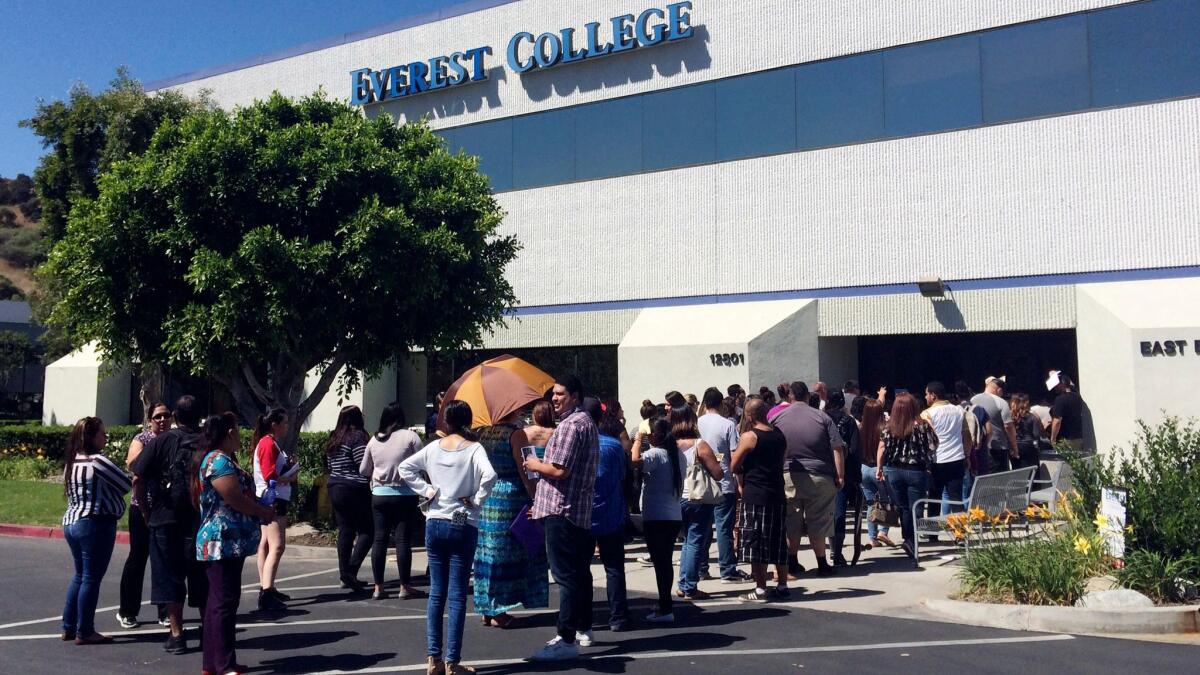Education Department scraps policy of fully forgiving all defrauded Corinthian students’ loans

- Share via
Students who were defrauded by the for-profit Corinthian Colleges may not get their loans forgiven entirely, the Education Department announced Wednesday, in a reversal of the Obama administration policy of wiping out the debt.
Under President Obama, tens of thousands of students deceived by Corinthian — which operated schools under its Everest, Heald and WyoTech brands before collapsing in 2015 — had more than $550 million in federal student loans canceled in full. Among judges’ findings against Corinthian was that the school falsely advertised, providing untrue or misleading statements about graduates’ job placement rates.
Education Secretary Betsy DeVos announced Wednesday she is putting a new process in place that she says is more efficient and fair. The department will now look at average income for specific programs to determine whether the loans should be forgiven fully or partially.
For instance, if a student who attended a nursing program at Corinthian is earning less than 50% of what the average income is for graduates of similar programs, that person’s entire loan will be wiped out. But a student earning more than 70% of average earnings would get only 30% of the loan canceled.
“No fraud is acceptable, and students deserve relief if the school they attended acted dishonestly,” DeVos said in a statement. “This improved process will allow claims to be adjudicated quickly and harmed students to be treated fairly. It also protects taxpayers from being forced to shoulder massive costs that may be unjustified.”
Corinthian students who had their claims approved in full under the Obama administration, even if the money hasn’t been disbursed, will see the payments in full. The change will affect students whose claims had not been decided by Jan. 20, the date of President Trump’s inauguration. The decision will affect more than 20,000 pending claims.
Student advocates criticized the decision.
“It’s unfair and it’s unlawful and arbitrary,” said Eileen Connor, a litigator at Harvard University’s Project on Predatory Student Lending, which has represented hundreds of defrauded Corinthian students. Connor said these students wasted not only money, but also time.
“With respect to the clients that I’ve seen, the idea that any of them should get partial relief is really contrary to the facts and the law. It would be like somebody showing that their car has been stolen and the department giving them back a door.”
Connor said her organization will challenge the decision with lawsuits.
Critics say the Trump administration has deep ties to the for-profit education sector and is looking out for industry interests at the expense of students. This year, Trump paid $25 million to settle charges that his Trump University misled students. DeVos has filled several senior positions at the Education Department with officials from for-profit schools.
DeVos insists that Obama-era procedures left room for borrowers to abuse the system at the expense of taxpayers.
She also said the department has resumed approving loan forgiveness claims, after sitting on tens of thousands of applications for many months. The agency said that it has approved 12,900 pending claims from Corinthian students, some in part and some in full, and that 8,600 claims were denied. Those claims were unsubstantiated and some of the denials were carried over from the previous administration, the agency said.
It was unclear what earnings data the government would use to make the decisions.
It also was unclear what would happen if a student was unable to find work in his or her field and ended up taking a job in a different sector. A department official said only that the agency would look into that issue if complaints arise.
“Some harmed borrowers may now get partial relief solely because they hold a minimum-wage job, even though it’s not in the field they prepared for and provides no long-term path to solid employment,” said Ben Miller, a higher education expert with the Center for American Progress, a liberal think tank. Miller added that anybody working a part-time minimum-wage job would be prevented from getting full relief.
“The massive drop in the percentage of relief granted punishes borrowers who succeeded in spite of their unacceptable training.”
More to Read
Inside the business of entertainment
The Wide Shot brings you news, analysis and insights on everything from streaming wars to production — and what it all means for the future.
You may occasionally receive promotional content from the Los Angeles Times.










